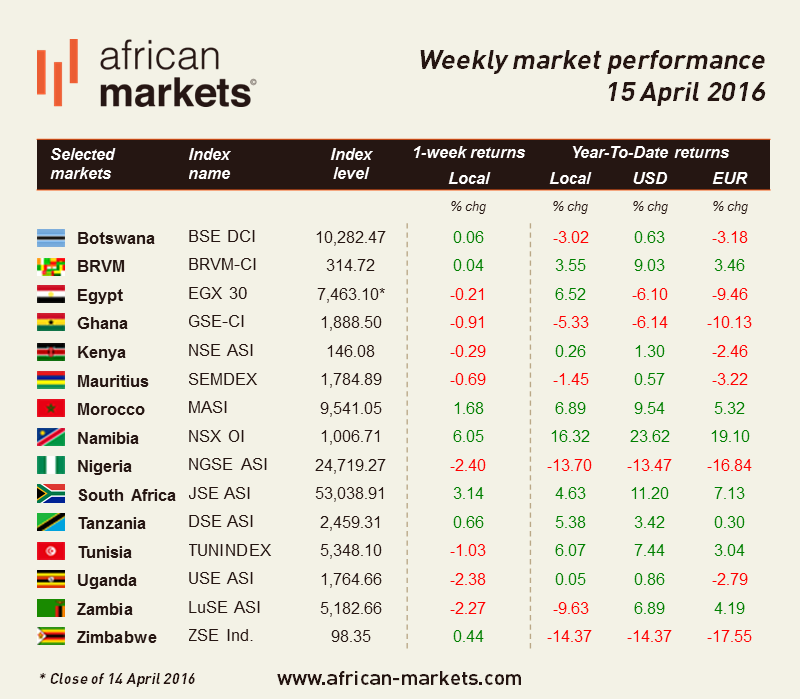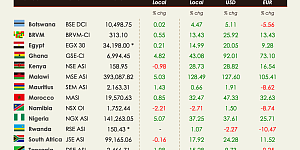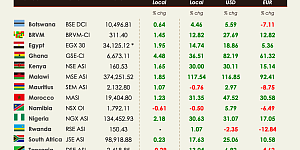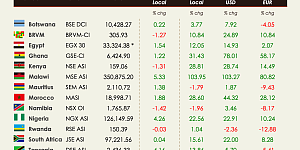News that Chinese economy grew at its slowest rate in seven years (6.7% at annual pace) put a damper on a few African indices Friday erasing the excitement triggered by upbeat Chinese data suggesting a rebound in activities perceived as an early sign of economic recovery. The biggest losses were witnessed on shares depending on China as a market for their commodities. Adding to the uncertainty climate, the Doha meeting took place over the weekend. World major oil producers met in Qatar Saturday to discuss an output freeze to boost prices. Hopes are big for the investors as a failure to reach a deal could lead to a collapse in oil prices, a sharp sell-off in the markets and maybe risk aversion returns on the market, which is not supportive for African markets sentiment.
In South Africa, Zuma premium seems to fade away as the rand scored back its 9th December level, trading near 14.62 per dollar this week. The threat of a downgrade by rating agencies remains an overhang on the rand. However, three necessary conditions could see the rand further rallying: a continuous dovish stance of the Fed, flat US data and the country not losing its investment grade status. In addition, as part of concessions to secure regulatory approval for SABMiller’s takeover, AB InBev will invest R1bn to support South African farmers. The Company traded 3.3% higher on this news. JSE ASI rose 3.14%.
Zimbabwe faced some turmoil this week. President Mugabe declared that nearly $15bn from diamonds revenue has vanished. This raised concerns over his leadership prompted protests in the country with some citizens urging the President to leave office. ZSE Ind. increased by 0.44%.
NGSE ASI plunged by 2.40%. Nigeria’s economy is still fragile. The country entered a currency swap deal with China this week with the aim to support its weakening currency and help fund the 2016 forecasted 2.2 trillion naira deficit. The renminbi has been inserted in the foreign exchange reserves of Nigeria and is thus free to circulate among the various banks of the country. Through diversifying away the foreign exchange reserve from the dollar, the deal makes yuan transactions easier. The unconfessed but potential idea behind this move is the possibility to issue yuan-denominated bond in China which should be cheaper than Eurobonds. So-called panda bonds could support Nigeria’s weakening currency as President Buhari refuses to devalue the currency. The question though is whether this will be enough… In parallel, Dangote Group signed a $2bn loan deal with the Industrial and Commercial Bank of China to fund two cement plants.
GSE-CI fell by 0.91%. According to the statistics office, Ghana’s inflation reached 19.2% in March coming from 18.5% in February. As an attempt to fix fiscal issues and the consequent inflation, the country entered a three-year aid programme with the IMF.
NSE ASI slightly fell by 0.29%. Following Chase Bank Kenya’s new receivership status, Central Bank Governor announced Monday that the “bank would provide a facility to any bank or microfinance institution that faces liquidity problems through not of its own”. This comes as a reassuring moves to contain arising concerns over the health of the country’s banking sector after three lenders were taken over by the Central Bank in nine months’ time. Moreover, in order to finance the deficit, Kenya agreed to a $600mn loan from China. The goal is to reduce domestic borrowing with a view to contain pressures on domestic interest rates which are expected to decrease as soon as the money comes in.










































